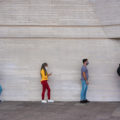Did COVID-19 help us get closer or rather increase polarisation?
Did COVID-19 help us get closer or rather increase polarisation?
The COVID-19 pandemic has challenged the world in many different ways. How has it affected polarisation among religious and secular groups?
This article was written in preparation for our round table on ‘A Pandemic of Polarisation’.
Challenging times
The COVID-19 pandemic has challenged the world in many different ways these past two years. It has brought up questions of solidarity between nations, of responsibility for the other, and conflicts regarding the way we should approach the virus. This article focuses on how the pandemic affected polarisation among nations, religious and secular groups, and people in general.
COVID should make us closer
One religious figure who has been especially vocal on this topic is Pope Francis. On many different occasions, he has underlined the possibility to look at COVID-19 as an opportunity to decrease polarisation among human beings and as an occasion to show solidarity. He argued that the pandemic can be a ‘place of conversion’[1] and claimed that the only way to overcome the crisis is through solidarity.[2] In ‘Fratelli tutti’ – published by the pope in October 2020 – he emphasised that we should live as one large family and proposed concrete actions to overcome the COVID-19 health, economic, social, and political crises. These actions include peace, dialogue, the strengthening of multilateralism, the fight against indifference, and the promotion of social inclusion.[3] [4] [5]
Moreover, the pope has also expressed the importance and need for solidarity regarding the vaccine. When the vaccines were first developed, he emphasised that the vaccine is “for everyone, we need to get out of the logic of profit.” Francis also added that we should share it equally among people and nations, regardless of their economic abilities or any other alien consideration of market and profit. He stated: “It would be sad if in providing the vaccine priority was given to the richest, or if this vaccine became the property of this or that nation, and it was not for everyone.”[6]
An example of a solidarity act made by the pope during COVID-19 towards the ‘other’ was his support to the transgender community in April 2020.[7] [8] [9] In addition, in March 2020, Pope Francis criticised the fact that many of the poorest people in the world are ignored by those in power and donated 100,000 euros to the Italian branch of the church charity, Caritas, to help the poor in the COVID-19 crisis.[10] In June 2020, the pope established a fund containing a million euros, dedicated to Roman citizens who are suffering from problems at work due to COVID-19. This mainly concerned daily workers, those with non-renewed contracts, and those who no longer had a job because of coronavirus.[11]
Another important religious figure in the fight against COVID-19 was the Archbishop of Canterbury, of the Anglican Church, Justin Welby. He repeatedly called people to get a vaccine in the name of the commandment of ‘loving thy neighbour’. He stated: “Jesus Christ calls us to love our neighbour as ourselves. Getting the vaccine is part of that commandment: we can show our love for each other by keeping each other safe from this terrible disease.”[12] He also added that people who refuse to get a vaccine are immoral.[13]
Religious institutions and solidarity
Another call to solidarity was a podcast made by the World Economic Forum. The podcast underlined the importance of religious leaders from all three monotheistic religions – Christianity, Judaism, and Islam – to unite in the US and “develop creative ways to provide comfort, care and worship services to individuals and families via different digital media (e.g., Zoom calls, Facetime, Facebook Live, and Skype).”[14] [15]
Moreover, the institutions Religions for Peace (RfP) and UNICEF started the global Multi-Religious Faith-in-Action COVID-19 Initiative.[16] The goal of this program was “to strengthen the critical roles of religious leaders in shaping community mobilisation to fight the pandemic.” It aimed to bring together the most important leaders from different religious groups and to develop “common theological opinions” that would help convince people to comply with international and national health authorities’ guidance regarding religious gatherings, services, and rituals, and that would push religious institutions to teach about hygiene, sanitation, and cleanliness.[17]
The G20 Interfaith Forum
In October 2020, a group of hundreds of religious leaders from Christian, Jewish, and Muslim communities, policymakers, and other experts gathered online to discuss action in the COVID-19 crisis. They emphasised the essential role that religious communities play in helping to reduce the suffering caused by COVID-19. In the online conference, they underlined the importance of solidarity and stated: “Today solidarity is not a choice or act of charity. It is a must. No one state or one leader can do it alone. This is the time of joint action.”[18]
The forum underlined the importance of more easily sharing information between different religious groups and between religious institutions and health/business sectors in order to create partnerships.[19] Marco Ventura, Professor of Law and Religion at the University of Siena, Italy, stated: “Faith communities have to be acknowledged as a partner with laboratories of human centred artificial intelligence and digital technologies in general for health and well-being as far as our analysis of COVID-19 is concerned.”[20] It is this cross-sector cooperation that will help overcome COVID-19, according to Dr. Tamader Al-Rammah, Member of the United Nations Committee of Elimination of all Forms of Discrimination against Women (CEDAW). Finally, the forum highlighted the importance for faith leaders to take care of children – an extremely vulnerable group in the pandemic and in regards to their spiritual wellbeing.[21]
Increased polarisation and COVID-19: Haredi and Hasidic groups
Despite these many calls for solidarity, COVID-19 has also increased polarisation between several religious and secular groups. In Israel, for instance, the pandemic almost divided the nation in two. On the one hand, some ultra-Orthodox denied the gravity of the pandemic and disregarded lockdowns. On the other hand, most secular people took the danger of the pandemic seriously. In some cases, the ultra-Orthodox communities were even blamed for the pandemic in Israel.[22] [23] In the US, there were also many conflicts between the state and ultra-Orthodox communities [24] [25] [26] For instance, at the beginning of the pandemic, ultra-Orthodox groups – despite warnings of the authorities – continued gathering in New York, increasing the rate of spread of the virus.[27]
Similar developments touched Europe as well. In October, as part of the celebration of the Jewish new year, thousands of Hasidic groups went from Israel to Ukraine to visit the grave of an important Rabbi for their tradition – Rabbi Nachman of Breslov. On their way back to Israel they faked negative COVID-19 tests, again arousing polarisation between secular and religious groups in Israel and around Europe.[28] [29] [30]
Blaming Jews for the pandemic
COVID-19 also brought back to life antisemitic accuses.[31] Conspiracy theories blamed Jews and Israel for the pandemic. These theories, according to researcher Efraim Karsh, are “new mutations of historical strains of antisemitic conspiracy theories, including the ‘poisoning of gentiles’ motif and the accusation that the Jews want to control the world.”[32] In July 2021, in the Polish city of Głogów, during an anti-vaccine rally, participants chanted that the Jews are responsible for COVID-19 and that Jews “rule the world.”[33] [34] In Switzerland, Ivo Sasek, the founder of the Organic Christian Generation, spread a flyer accusing the Jewish Holocaust survivor George Soros of using COVID-19 as a biological weapon against the world. In Austria, Martin Sellner, a right-wing extremist and a member of the neo-fascist group Identitäre, also claimed that the Soros Open Society Foundation is to be blamed for the pandemic. Similar accusations were made in Iran, Turkey, and the US.[35]
Blaming Muslims for the pandemic
In India, conspiracy theories accused Muslims of being responsible for the spreading of COVID-19 to the Hindu majority. As a consequence of the accusations, Muslim businesses were boycotted across the country and Muslims were accused of “spitting in food and infecting water supplies with the virus.”[36]
The pandemic also led to an increase in Islamophobic online attacks in Europe. Islamophobic ‘cyber hubs’ were published that accused Muslims of being responsible for COVID-19.[37] Moreover, according to the European Islamophobia Report 2020, there was an increase in online Islamophobia throughout Europe during lockdowns. According to the study, “Islamophobia has moved to the private sphere and is being spread especially in social media.”[38] Other studies have also reported on rising levels of Islamophobia as the virus spread.[39]
Between solidarity and polarisation
In this article, we have seen on the one hand how religious leaders have stressed the necessity of solidarity among religions, nations, and people throughout the pandemic. On the other hand, the pandemic often brought an increase in polarisation between religious and secular people, such as in the case of Haredi groups, but also inside religious groups themselves – such as between Orthodox and liberals. Moreover, some found a scapegoat in minorities, leading to blaming Jews or Muslims for spreading the virus.
It therefore appears that COVID-19 has had mixed effects on society and on individuals. At times, it has helped in showing the good and the importance that there is in solidarity, such as in the example of the pope’s gesture towards transgender communities and his donations towards the poor and developing countries. However, in many other situations, the tension brought about by the pandemic increased conflicts and polarisation among different groups, such as in the case of the Jewish and Muslim populations.
Want to learn more about similar topics? Go to the EARS Dashboard.
Sources
[1] Pope Francis says pandemic can be a ‘place of conversion’
[2]Il Papa: il mondo ha bisogno di unità e fratellanza per superare la crisi – Vatican News
[3]Pope’s three key messages to understand new “All brothers” encyclical
[4]Fratelli tutti (3 October 2020) | Francis
[5] ENCICLICA “Fratelli tutti” sulla fraternità e l’amicizia sociale
[6] Papa Francesco: “Vaccino per tutti, bisogna uscire dalla logica del profitto”
[7] Pope Francis Sends Almoner to Help Transgender Community Affected by COVID-19
[8] Coronavirus, una comunità trans chiede aiuto in chiesa e interviene l’elemosiniere del Papa. Il parroco: “Persone sole, ma con molta fede” – Il Fatto Quotidiano
[9] Covid, trans chiedono aiuto al Papa. E Francesco manda in soccorso l’Elemosiniere
[10] Pope Francis donates 100,000 Euro to Caritas Italy’s COVID-19 work
[11] Il Papa istituisce un Fondo per la dignità del lavoro a Roma. E dona un milione
[12] Love thy neighbour and get a COVID jab, says Archbishop of Canterbury | Reuters
[13] Jesus would get a vaccine, Archbishop of Canterbury suggests | Daily Mail Online
[14] We need responsible multifaith solidarity to fight the pandemic | openDemocracy
[15] Love your neighbour: Islam, Judaism and Christianity come together over COVID-19 | World Economic Forum
[16] Launch of Global Multi-Religious Faith-in-Action Covid-19 Initiative
[17] We need responsible multifaith solidarity to fight the pandemic | openDemocracy
[18] “Solidarity is not a choice or act of charity. It is a must”: Addressing COVID-19 at the G20 Interfaith Forum | KAICIID
[19] “Solidarity is not a choice or act of charity. It is a must”: Addressing COVID-19 at the G20 Interfaith Forum | KAICIID
[20] “Solidarity is not a choice or act of charity. It is a must”: Addressing COVID-19 at the G20 Interfaith Forum | KAICIID
[21] “Solidarity is not a choice or act of charity. It is a must”: Addressing COVID-19 at the G20 Interfaith Forum | KAICIID
[22] Placing the Blame for COVID-19 in and on Ultra-Orthodox Communities
[23] How the Pandemic Nearly Tore Israel Apart – The New York Times
[24] The Orthodox Jewish Community and the Coronavirus: Halacha Grapples with the Pandemic
[25] The Hasidic Community’s Reckoning Over COVID-19 – The Atlantic
[26] When COVID-19 rules are flouted by ultra-Orthodox Jews, it isn’t anti-Semitism to call it out
[27] As virus spreads, US officials struggle to halt ultra-Orthodox gatherings | The Times of Israel
[28] Israelis Who Flew Into the Country Using Fake Coronavirus Test Results Under Scrutiny – The New York Times
[29] Israel to prosecute Hasidic pilgrims who faked negative COVID tests to fly home | Israel | The Guardian
[30] Israel to prosecute Hasidic pilgrims who faked negative COVID tests to fly home | Israel | The Guardian
[31] Antisemitic Flyers In Beverly Hills Blame Jews For COVID – I24NEWS
[32] Anti-Jewish Coronavirus Conspiracy Theories in Historical Context
[33] Anti-Jewish Coronavirus Conspiracy Theories in Historical Context
[34] Polish anti-vaccine protesters chant Jews are to blame for the COVID-19 pandemic | The Times of Israel
[35] Anti-Jewish Coronavirus Conspiracy Theories in Historical Context
[36] Coronavirus conspiracy theories targeting Muslims spread in India | India | The Guardian
[37] COVID-19 sparks online Islamophobia as fake news and racist memes are shared online, new research finds | Birmingham City University
[38] COVID-19 pandemic deepens online Islamophobia in Europe
[39] “A Virus Has No Religion”: Analyzing Islamophobia on Twitter During the COVID-19 Outbreak






